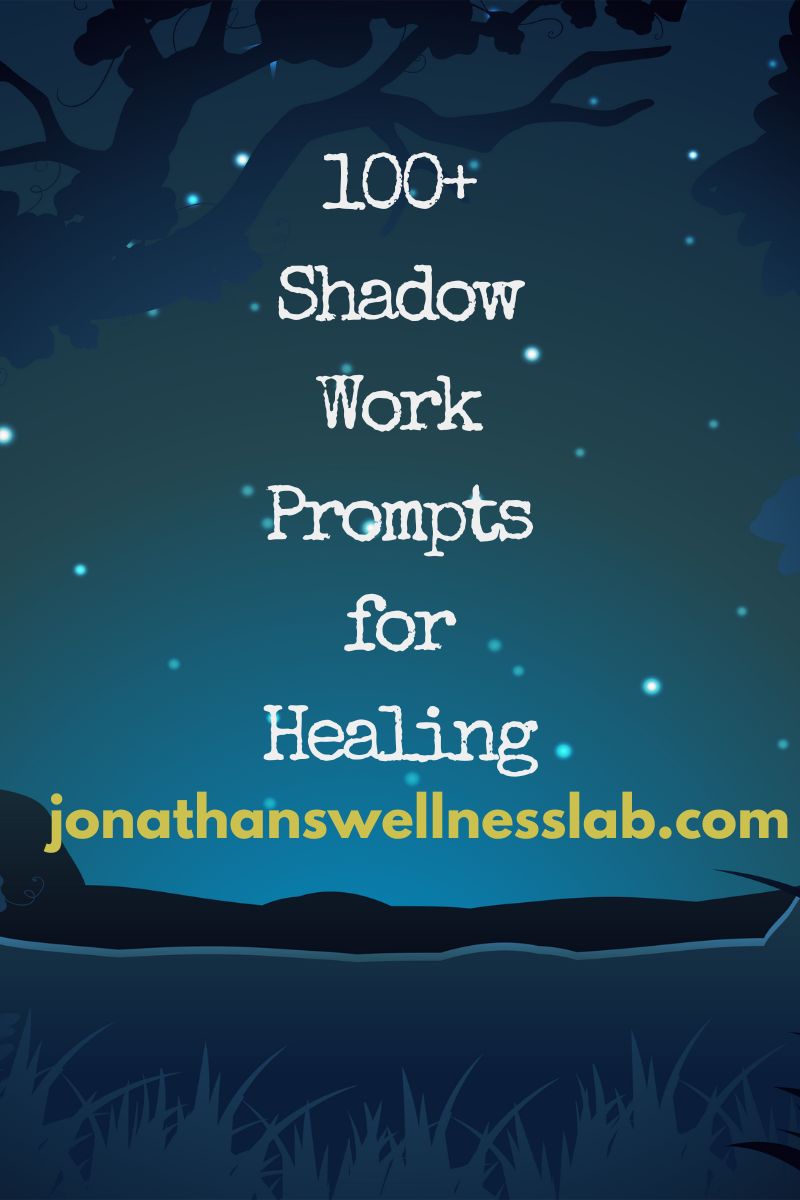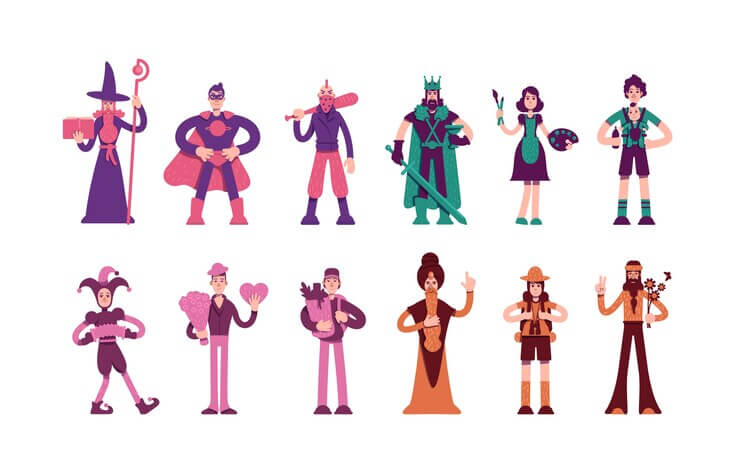
Have you ever felt that there’s a hidden part of yourself that is beneath the surface of who you pretend to be in daily life? Welcome to the world of Shadow Work Prompts, my friend.
Ready to meet your Shadow Self face-to-face? Get ready for some Shadow Work prompts.
Facing your shadow self is one of the most uncomfortable activities that you can do on your journey of personal growth, but also one of the most healing.
If you’ve ever found yourself going back and forth between healing and being in intense pain, it’s often because of what’s lurking in the shadow self.
Diving into your painful emotions and memories is a must if you want to get rid of them.
Warning: Facing your shadow self can lead to tears, discomfort, and confronting your inner demons. It can stir up a lot of pain!
Use shadow work prompts with a therapist or other licensed mental health professional.
What Is Shadow Work?

The term “shadow self” was coined by none other than the legendary Carl Jung. Carl Jung believed that there are many different parts of ourselves that are secretly running the show.
He also came up with the concept of different archetypes and subpersonalities that are within each human being.
Carl Jung believed that the shadow self originated from deep human evolution, going back to our primalist days.
It’s a side of ourselves that is chaotic and messy – hence the erratic behaviors that stem from it.
Have you ever had a sudden burst of anger towards a person, thing, or situation and didn’t know where it came from? Yep, shadow self.
The shadow self is not a singular entity, but rather a compilation of the parts of ourselves that we consider wrong or deem inappropriate to ourselves and/or society.
Here are some examples of traits that we deem unacceptable:
- Being emotionally sensitive.
- Standing up for ourselves.
- Cutting people off.
- Being alone a lot.
- Snapping at people in certain situations.
Oh, and can you guess what percentage of the human population has a shadow self? If you said 100%, you’re right.
Every human on this planet has a shadow self.
Unique to Each Individual
Just as each of us has our own unique fingerprint, the same goes with our shadow self.
Just as you can juggle up a deck of 52 cards and then deal each person a unique combination, so goes with the shadow self.
It sounds too cliche, but we all have our inner demons. You might have similar inner demons to certain people, but no two people have the same exact combination of inner demons.
Something that you don’t like in someone else could mean nothing to me. However, what makes you sad might make me angry.
What offends me may not mean anything to you.
It’s because each human being has a different childhood and background that affects their neuroplasticity and psychology.
The Consequences of Avoiding Shadow Work
If there’s one thing that I learned on my own personal development journey, it’s that resistance creates suffering.
It sounds contradictory to reality, I get it. Our first instinct when we feel any pain or suffering is to avoid pain, but by avoiding it, we resist it and then create more suffering.
You can try to ignore your negative feelings all day long, but the more you ignore them, the stronger they get. Resistance to negative feelings = stronger negative feelings.
The only path that will resolve your inner fears and turmoils is by facing them and embracing them.
No, embracing negative thoughts and emotions does not mean that the feelings will be here forever. It’s allowing them to leave – forever.
Dive Into Your Past to Prove This Point
Ever had a breakup and it was just crushing you inside?
What happened when you tried to forcefully forget about the person? I bet you thought about them more. That’s because you were resisting the fact that they aren’t with you anymore.
It was only when you fully accepted and surrendered to what is that you stopped resisting and subsequently, the person disappeared from your mind like cigarette smoke in thin air.
How to Use Shadow Work Prompts For Healing

Let’s get one thing straight – resolving your shadow self’s inner demons is not the end-all and be-all for happiness.
Why? Because who you are is so much greater than your psyche. I believe that we all have souls and spirits and you may believe that also.
The shadow self is just one aspect of who you are. Resolving the shadow self’s inner demons it’s just one piece of your life’s self-growth puzzle.
You don’t have to confront the shadow self every day for the rest of your life – why? Because it’ll always be there and new stuff shows up all the time, even in the best of us.
However, you will make a huge quantum leap in your life if you can overcome the greatest inner demons that have been there for years, such as the ones you’ve had since childhood.
Can you overcome every single inner demon within the next year? Maybe not, but what if you could overcome your biggest insecurity? Oh, heck yeah.
A Shadow Work Journal Is Your Self-Growth Friend
So now that you know about your shadow self, you might be wondering, what the heck do I do with all this inner chaos?
It’s true, the shadow self is a big, massive chaotic mess and I feel you if you’re overwhelmed.
The Shadow Self Journal to the rescue!
The benefit of a shadow self journal is that you take all of your insecurities, fears, and troublesome thoughts and turn them into an organized entity.
It’s like taking a big pile of 30,000 sheets of paper on the floor and then organizing them into specific folders. It really is a game-changer!
Being able to sort out and compartmentalize the humungous pile of crap in your mind can work wonders for healing. Shadow work prompts make personal development so much easier.
Here are a few other benefits of Shadow Work Journaling:
- It’s a safe place to explore your Shadow Self – private and personal.
- You can share it with your therapist when you get stumped for words.
- You acknowledge your shadow side, rather than hiding it away from yourself.
Ok, ready to break out that journal and get started?! I’ve got a list of 100 shadow work questions for you.
Get creative with this process. You can just work through one question per day or whatever works best for you.
100 Beginner Shadow Work Prompts For Your Journal
- What are the top 5 benefits that I want to get from shadow work?
- Why is doing shadow work a must in my life?
- What is my life going to be like if I don’t confront my inner demons?
- Why does the pain of confronting your inner demons outweigh the pain of avoiding them?
- Why will confronting and embracing your shadow self benefit your relationships?
- How will your parents benefit because you faced your shadow self?
- How will your friends benefit because you confronted your shadow self?
- Will your siblings benefit from you confronting your shadow self?
- What values did your family give you when you were a child?
- What things or situations make you tense?
- How would your closest friends or siblings describe you?
- What’s a fact about yourself that almost nobody knows?
- What’s something embarrassing about yourself that is hard to share?
- If there was a biography written about you, what would each chapter say?
- How do you think your coworkers would describe you?
- What is something about yourself that makes you feel inferior to others?
- What’s a behavior that you have the often gets misinterpreted by others?
- What kind of responsibilities drains your soul?
- Does being told what to do evoke any anger inside of yourself?
- If your name was beside one word in the dictionary, which word would it be?
- What are some expectations at work or school that are hard for you to reach?
- When people come to you for advice, what is the most common topic?
- What’s a natural gift that you might have, but avoid because you fear failure?
- If God spoke to you right now, what do you think he’d sound like?
- If God spoke to you right now, what would he say about you?
- What does it mean to be a good person?
- What does it mean to be good?
- Where does the idea of being a “good person” come from?
- Why is being a good person, even when it’s hard, important to you?
- Where do your ideas about what it means to be good come from?
- What does it mean to be evil?
- Where do your ideas of what being evil is come from?
- How would you define the word “evil”?
- What does “being evil” mean, in terms of yourself and the world in general?
- Is your belief system trustworthy? Why or why not?
- In what ways have your beliefs about the world served you?
- What are some negative beliefs that you have about the world that have caused suffering in your life?
- Do you believe that most people are trustworthy?
- Why should you trust anyone, even your closest friends?
- Think of a person that you trust more than anyone. What about them makes them trustworthy?
- Do you consider yourself trustworthy?
- Why or why not should someone trust you?
- Do you consider yourself to be a great friend?
- What about you makes you a great friend?
- Do you struggle with self-compassion?
- How do you feel when you give yourself the gift of compassion?
- When was the last time that you forgave yourself for anything? What did you forgive yourself for?
- If you could start your life from scratch, which career would you do?
- Who are the three closest people in your life and how did they shape who you are and your beliefs?
- What type of people tend to be magnetized towards you?
- What is one secret that you would share with the world if you could be anonymous?
- What are 3 self-care practices that make you feel amazing about yourself?
- When was a time that someone else showed you compassion and how did it make you feel?
- When you are hard on yourself, where do you think that comes from?
- What is the first thought that you have when you are criticized by someone else?
- Why is it so difficult for you to be nice to yourself?
- When was a time that you put unwarranted pressure on yourself?
- Did your parents put a lot of pressure on you growing up and/or during adulthood?
- What situations make you feel like a loser?
- What situations make you feel like a winner?
- What situations cause you to question your worth?
- What types of people intimidate you?
- How do you react when an intimidating person communicates with you?
- What types of people intimidated you when you were growing up?
- What’s a situation that makes you feel better than someone else?
- Do you ever intimidate anyone?
- What might cause you to intimidate someone, even if you don’t mean to?
- What’s a situation where you want to intimidate someone?
- Is intimidating someone that result of protecting yourself?
- How have your spiritual beliefs made you who you are today?
- What would you be like without your spiritual beliefs?
- What is a time that you did something cruel to someone and needed forgiveness? How’d it go?
- How did you feel when you got forgiveness or didn’t get forgiveness?
- What makes you feel deserving of forgiveness?
- What makes you feel undeserving of forgiveness?
- What is a recurring behavior of yours that keeps needing forgiveness from others?
- Have you noticed that you repeat a negative behavior, again and again?
- What does your inner voice sound like? Is it rude, kind, weird, or friendly?
- Is your inner self-talk mean or kind towards you most of the time?
- When you talk about yourself to others, are they mean or nice words?
- Do you welcome compliments from others or do they embarrass you?
- When someone is mean or rude to you, do you normally hang on to it or let it go?
- Who was the most influential person in your life? Are you glad that they influenced you?
- What in life gives you fulfillment and purpose?
- If you feel that your life has no purpose, what is one small thing that you could do to give it some sort of meaning?
- What situations make you feel like your life has a purpose?
- What situations make you feel like your life has no purpose?
- What could you do more of in your life to make it feel more purposeful?
- If you could live your purpose every day, what might that look like?
- Can you accept life as it is the best that you can, even if you feel it has no purpose?
- What types of movement make you feel awesome (working out, yoga, etc.)?
- What are a few ways that you can start showing yourself compassion every day?
- How do you feel when people violate a boundary that you set?
- Do you often allow people into your life that violate boundaries that you’ve set?
- Do you set too many boundaries in your relationships, too little, or is it just right?
- What are the top 3 boundaries that you continually allow to be violated?
- Which boundaries are you committed to keeping in your relationships?
- What are your top 3 most common boundaries?
- Why does having boundaries make you happier?
- How does not having boundaries affect your life?
How to Use Shadow Work Prompts
A lot of times, we feel a certain way and have no idea why. But hey, even if you react a certain way and don’t know why, you’re demonstrating good self-awareness.
We all have unique situations that make us feel a certain emotion – good or bad.
You might get angry at your significant other or spouse and you have no idea why. Maybe you want to fix the problem but have no idea where to start.
That is why having a therapist and doing shadow work is so awesome. You are getting to know you better than ever before.
Every time that you answer one of your shadow work prompts, you’re getting to know yourself a little bit more and then just a little bit more.
Before you know it, you’ve asked and answered a gazillion questions about yourself and are getting to know yourself better than ever before.
This is the past of self-mastery. A high level of personal introspection and the willingness to improve yourself is the key to a rich life – emotionally and in countless other ways.
My little Bonus: Carl Jung’s Archetypes Explained

I know that this shadow self stuff might be new to you. I think it’s important to pay my respects and give credit to the great Carl Jung for coming up with a lot of this stuff.
Here’s a brief summary of all of Carl Jung’s 12 archetypes that dwell within the collective unconscious of human beings.
1. The Sage
When a hero is lost on their journey, they turn to the sage. The Sage is the go-to person when the hero can’t figure out how to overcome an obstacle.
It’s not a physical thing but rather the knowledge that the Sage gives the hero. In contrast, a hero may already know what they need to get to the next level but just needs a reminder from the Sage.
2. The Innocent
The innocent is an optimist who values happiness and simplicity above all else. They veer as far away from evil and corruption as possible by adhering to powerful values.
The Innocent doesn’t only seek out happiness for themselves but for the world.
They desire the well-being of the entire planet. They are truly “innocent” because their intentions are good and pure for both themselves and others.
3. The Explorer
Being a natural explorer myself in both my inner and physical worlds, I love this archetype!
The explorer can enjoy exploration on both a material and immaterial level. They love thrill, excitement, and finding new things in life.
They love to venture out into the unknown and into a world of possibilities. They want to escape the boring, mundane aspects of daily life.
4. The Ruler
The Ruler archetype desires to rule (hard to believe, right?) and wants power over the world. The ruler can become a powerful person of influence or a corrupted king.
We live in a very ruling world in ways that you might not imagine. Social media is a good example of wanting to be as powerful as possible and outdo other people’s social media profiles.
The Ruler tends to want control and is capable of craving power over others.
There are positives to wanting to rule, but having the Ruler as your most powerful archetype can cause narcissism and/or an uncontrollable ego.
5. The Creator
Another one of my favorite archetypes! The Creator loves originality, innovating, and creating new ideas.
One person who really embodies this archetype is Elon Musk. He’s constantly creating, innovating, and bringing new ideas to life. He’s got countless creations in his head that have yet to manifest.
The weakness of the Creator is that it can create a little too much.
For example, if a business only has the manpower to execute one idea at the moment, it can overwhelm both itself and its employees by trying to bring to many ideas to fruition at once.
6. The Caregiver
The Caregiver is just the best. In fact, unlike some of the other archetypes, I can’t think of any downside to being a Caregiver.
The Caregivers are the Mother Teresas’ of the world. They genuinely find fulfillment and life satisfaction by helping others.
Even mean people might have the occasional moment when the Caregiver comes out. It’s an archetype that makes the world so much better in more ways than one.
7. The Magician
Similar to The Sage, the Magician bears both new and ancient knowledge.
The Magician unveils mysteries and enchanting secrets. They love the magic and uncertainty about life.
Have you ever gazed into the night sky and loved the mystery and magical beauty of it all – that’s the magician.
The Magician is a seeker of knowledge that can be used for power – for both themselves and others. Seeking knowledge for power can be abused though.
8. The Hero
The Hero is a self-sacrificing archetype that is courageous and willing to face evil. They’re willing to sacrifice their own comfort.
The hero is willing to take on a potentially dangerous journey to defeat evil and make the world a better place.
Good examples of the Hero archetype are Harry Potter and Simba from The Lion King.
9. The Outlaw
The Outlaw may sound like a bad archetype, but keep reading. The Outlaw can be a bad person, but they can also be rebel against evil.
Think about Robin Hood and his Merry Men. They rebelled against a greedy society for the betterment of others. They stole from evil corrupt humans and gave to the needy.
10. The Lover
Another wonderful archetype! The Lover loves other people, life itself, God, and all of the above. The lover finds the good in others and loves unconditionally.
The lover embraces the journey of life. Even obstacles are simply seen as gifts in disguise.
The Lover appreciates the gift not only within themselves, but other people. They find the good in people whereas other archetypes may find only the bad.
11. The Jester
Ever had a moment where you were totally carefree and you found the humor in something that may offend someone else? It is none other than The Jester himself.
The Jester is one funny dude. If he goes through a difficult time in life, he finds humor in it. He laughs in the face of judgment, ridicule, and challenging times.
While The Jester can have a dark side and deceive or manipulate others, he is also capable of good.
Because he is the master of tricks, he knows the intentions of others and can see right through manipulation. A good Jester is a narcissist’s worst nightmare.
12. The Regular Person
This archetype is able to relate to other people and perceives them as equals. The Regular Person represents the common hurdles of being human and wants to live the good life.
Oh, but what happens if The Regular Person needs to save someone from a monster? It might need to turn into the Hero for a bit!
What if The Hero completes his journey and needs to rest for a little bit? No probs! He can morph into The Regular Person and chill for a bit.
Heal Thyself With Shadow Work Prompts
Thanks for reading! I hope you enjoyed learning about the shadow self and how to use shadow work prompts to learn more about your shadow self.
Here’s a reminder: Uncovering the shadow self is not the end-all and be-all for personal growth, so don’t obsess over it too much.
Get started on shadow work prompts today and let me know how it’s going for you in the comments below!
Hit me up if you have any questions about shadow work prompts 🙂
